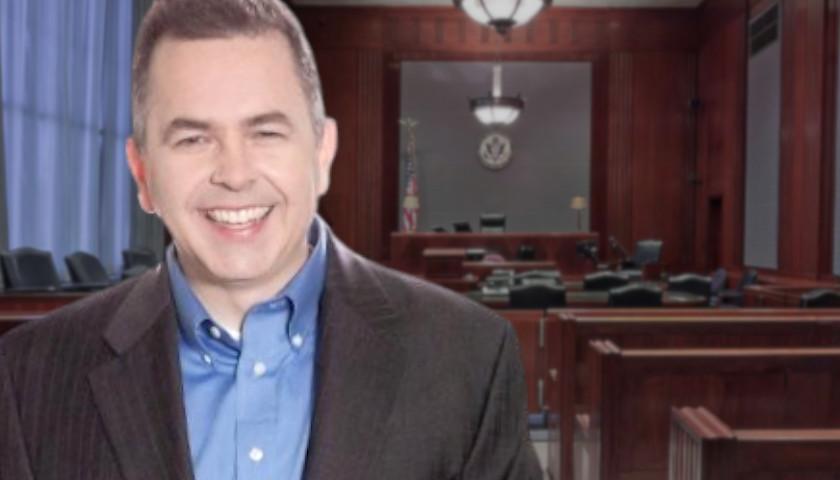The Florida State Bar is pursuing disciplinary charges against decorated veteran Chris Crowley over remarks he made about his opponent Amira D. Fox in 2018 when he was campaigning against her for the Office of the State Attorney in Florida’s 20th Judicial Circuit. Most state bars have an ethics rule, adopted from the American Bar Association’s model rules, that restricts attorneys from criticizing public officials, candidates for office, and judges.
A Florida attorney familiar with the case, who preferred not to be identified due to fear of retaliation, told The Arizona Sun Times, “The Florida Bar is now a political organization dominated by the progressive left. The Florida Bar picks and chooses which political speech to go after, depending on who is politically connected. This is a disgrace to the legal profession.”
The source said Fox is part of the establishment.
Crowley was accused of violating Rule 4–8.2(a) of Rules Regulating the Florida Bar, which states, “A lawyer shall not make a statement that the lawyer knows to be false or with reckless disregard as to its truth or falsity concerning the qualifications or integrity of a judge, mediator, arbitrator, adjudicatory officer, public legal officer, juror or member of the venire, or candidate for election or appointment to judicial or legal office.”
The Florida Bar has taken a “strict anti-First Amendment stance,” according to Crowley’s attorneys at The Rutherford Institute, and calls for a one-year suspension of his license for “political speech.” Constitutional attorney John W. Whitehead, president of the group, said, “Nowhere in the First Amendment does it permit the government to limit speech in order to avoid causing offense or hurting someone’s feelings, protect government officials from criticism, penalize hateful ideas, combat prejudice and intolerance, and the like.”
Crowley, a decorated Gulf War veteran who served in Iraq and Kuwait and was a Lieutenant Colonel in the U.S. Army Reserve for 20 years, was a 2018 candidate for Florida’s 20th Judicial State Attorney position, which is the head prosecutor over several counties. The former Lee County Republican State Committeeman ran against Fox in the Republican primary. Fox defeated Crowley, won the general election, and currently holds the position.
During the race, Crowley referred to Fox as “corrupt” and “swampy” and observed that she had “close family ties to the PLO terrorist organization.” Former Trump advisor Roger Stone posted on Facebook during the race that he was appearing at a campaign event with Crowley to expose Fox, “who’s real name is Amira Dajana and who’s family founded the PLO.”
The initial bar complaint against Crowley was filed by prosecutor Rich Montecalvo, who cited Stone’s post even though Crowley didn’t write it. Montecalvo worked as a prosecutor under Fox.
The Florida Bar’s charges accused Crowley’s remarks as attacking Fox’s religion, citing one of his campaign flyers that stated, “she won’t answer questions about Sharia Law. Why?”
“I don’t know what religion Ms. Fox is and I don’t care,” Crowley told Naples Daily News.
“The issue is her ties to the PLO,” he said.
Fox’s father, Taher Dajani, wrote a book in 2008 titled From Palestine to America: A Memoir. In it, he described how his brother, Sidqi, served on the PLO executive committee at various times up through the 1980s. The book was dedicated to his daughters, Fox, and her sister.
The Florida Bar filed charges with the Florida Supreme Court against Crowley in April 2020. The charges also cited an incident where Crowley was arrested and charged with promoting a $670 lottery during the campaign. The outgoing prosecutor they were running to replace, Steve Russell, who endorsed Fox, “was quick to act on a tip showing a raffle taking place at a Crowley fundraiser,” the Naples Daily News reported. “Within weeks, Crowley was arrested on charges of promoting a lottery and violating Florida’s campaign contribution law, a swift comeuppance for what appears to be a first-time campaigner’s rookie mistake.”
Crowley said he was unaware the raffle was going to take place and returned the money as soon as he found out it was unlawful. He signed a Pre-Trial Diversion Contract, admitting he violated the law, and the minor incident was soon expunged from his record. Crowley said he wouldn’t be surprised if Fox arranged to have him arrested, and the Florida bar charged him for that statement as well.
The Florida Bar also charged Crowley with violating Rule 4-8.4, which states that attorneys shall not “engage in conduct in connection with the practice of law that is prejudicial to the administration of justice.” It is a catchall rule that is frequently used against attorneys when nothing else applies.
Crowley filed a response earlier this month, Respondent’s Motion to Reconsider and Vacate Findings of Referee Due to Subsequent Authority From U.S. Supreme Court. The motion cited the 2023 Supreme Court case Counterman v. Colorado, which held that “it is a violation of the U.S. Constitution’s First Amendment to penalize speech based solely on an objective or negligence standard without proof from the government of a more culpable, subjective mens rea of the speaker,” the pleading said. The Supreme Court said, “the First Amendment ‘still requires proof’ of the speaker’s subjective mental state as reckless.”
Crowley noted in his motion that even before the Supreme Court ruled that the standard required the additional showing of mens rea — a person’s knowledge that their act constituted that standard — previously an attorney who said something false about a judge he was running against for office didn’t pass the test for the standard of “reckless disregard” for the truth. In Attorney Grievance Comm’n of Md. v. Stanalonis, the court dismissed the complaint because “‘according to [the attorney’s] testimony at the disciplinary hearing, he ‘appear[ed] to have actually believed’ his statement and ‘[t]here was no evidence that [the attorney] entertained serious doubts as to the truth of his statement.’”
The ethical rule Crowley is charged with was ruled to be facially unconstitutional in another state. The Fourth Circuit Court of Appeals ruled in Grimmett v. Freeman regarding a very similar law in North Carolina that it was “unconstitutionally overbroad because it ‘criminalizes truthful derogatory statements so long as the speaker acts in reckless disregard of a statement’s truth or falsity.’” The court found it went against the Supreme Court’s “constitutional rule that absolutely prohibits punishment of truthful criticism even when such criticism is made with ill will or actual malice.”
Crowley filed countercomplaints after receiving the bar complaint, including one against the head of Amira Fox’s campaign PAC, a lawyer. Her PAC circulated a flyer against him. The Florida Bar dismissed the complaint without even a hearing.
Since the Florida Bar filed the charges against Crowley, four judges assigned to the case have recused themselves, citing conflicts of interest. All four judges used the same campaign treasurer as Fox. However, there have already been rulings by at least one of the judges.
Former Maricopa County Attorney Andrew Thomas was disbarred in 2012 after criticizing judges. Thomas helped draft a successful referendum in 2006 to prohibit bail for illegal immigrants accused of serious crimes. It passed with over 70 percent voter approval, but judges at the Maricopa County Superior Court circulated a memo among themselves with instructions not to enforce it. Thomas held a press conference denouncing the move, and the State Bar of Arizona pursued charges against him.
Crowley has oral arguments in a new Motion for Rehearing set for January 18th, 2024, based upon his new motion citing the recent Colorado v Counterman U.S. Supreme Court case. It begins at 1:30 p.m. EST and will be broadcasted on Zoom.
– – –
Rachel Alexander is a reporter at The Arizona Sun Times and The Star News Network. Follow Rachel on Twitter / X. Email tips to [email protected].
Photo “Chris Crowley” by Chris Crowley.






Welcome to Obama Biden America.